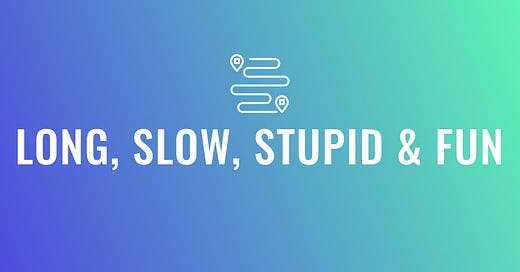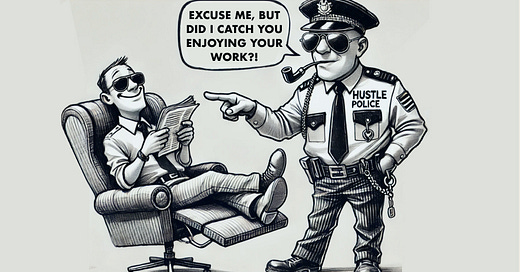March 2nd, 2024: Greetings from Austin! Our daughter turns 1 this weekend and I can’t believe how fast this first year has gone. My writing and attention has been a bit sporadic over the past year as I’ve leaned into dad mode but I’m starting to find a decent rhythm again and made a ton of progress on a small book I plan to publish in the next couple of months.
One thing that has energized me is to go back and read some of my writing from years ago. It’s helped me reconnect to the long game energy that drives me. I figured I’d share a couple pieces of those today because 90% of you have probably never seen some of my older writing. It was cool to see many of the same themes emerge over and over gain, especially before my writing started spreading over the past two years.
Check these out and let me know what you think.
Want to take a sabbatical? My friends and are launching a short course on taking sabbaticals. I’ve been inspired both both of their writing on the topic and if you are on a break from work or thinking about one, this might be something to check out.
Write Online: I’m also an affiliate for Write of Passage this spring and am potentially thinking about taking it to sharpen my book around their “one core idea” mission. If you want to test drive a workshop, you can test it on March 13th
Austin SXSW Meetup: I’m planning a SXSW meetup on March 11th. RSVP here
#1 Not Being In A Rush (July 2018)
A note from me, in 2024: This is an excerpt from a post I wrote titled, “The ten most surprising benefits of self-employment” in July 2018. This was a couple months before I moved to Asia. It was fun to go back and read this and see how committed I was to my creative explorations.
In the corporate world, there is always a sense that you could be moving faster. The two years I spent in New York were the most extreme version of this. Someone once said to me, “you’re doing well for your age” which must have meant I was headed in the right direction. Personally, I was already plotting my escape.
A career is an artificial path which you must always manage, have a story for and be networking so that you can take the next step. The next step being up, of course.
Being self-employed, there are no promotions or paths to judge yourself against. Other people’s confusion with this fact comes out when people invariably ask “what’s your plan?” or “how’s business doing?”
While this question has no answer, I respond with what I know to be true: “I am following my creative energy and seeing where it takes me.” This tends to drive a lot of people who are deep into career thinking a bit mad.
The poet David Whyte offers the idea of the “pathless path” which I take to mean that there may be a general feeling that you are headed in the right direction, but that you may not know which direction that is.
Staying true to my inner creative drive and trusting that things will work out forced me to put faith in other people, see myself as part of a bigger community and world and think deeply about how I can be a more generous member of this world and my communities.
#2 Long Slow, Stupid, Fun (September 2021)
A note from me, in 2024: I wrote this while writing my book in response to someone asking about why I was not optimizing for more subscribers on my mailing list. The question jolted me a bit and for a couple of issues, I set a “goal” of 5k subscribers. I then proceeded to do nothing to acquire such subscribers faster and just kept writing. It’s interesting to read about my expectations and see that I was more than happy with 75 people pre-purchasing my book. It’s mind blowing what’s happened in the last two years but I find myself coming back to this and remembering that this is the most fun mode I like to inhabit.
I’m not writing here to get subscribers. I’m writing it because I genuinely enjoy it and so do at least 20-30 people who keep telling me so. I’m writing to those people. I’m writing to the 75 people who bought my book. Not future potential subscribers.
While more subscribers may enable me to directly monetize my writing or make more money in the short run and ensure I can keep doing this indefinitely, the money will not actually change my approach to life over the next couple of years.
I was explaining this to someone during a curiosity conversation and a phrase came out of my mouth, the “long, slow, stupid, fun game.” Here’s how I’d describe it.
Long: Focus on the meta-game of finding the work I want to keep doing indefinitely. Don’t get distracted by shiny objects.
Slow: Do things slowly. Start small and level up over time.
Stupid: Lean against obvious ways to make more money when you sense it’s not the thing that will matter over the long run.
Fun: Am I still having fun? Keep going. If not, quit, optimize, or scale back.
This is a remix of Frank Chimero’s talk titled “The Long, Hard, Stupid Way” which dropped online almost ten years ago. In it he describes his approach:
And what’s really interesting is when you look at doing things the long, hard, stupid way, it’s sort of a spectrum (raises hands apart): there’s the way that I do it that’s very painful and difficult, but ultimately the way I feel compelled to make things; and then there’s optimum efficiency over here. I think what’s interesting is to sort of look at that gap and to analyze it. I think that, from the perspective of someone who makes things—and I bet that a lot of people out there are also folks who make things in some capacity—when you work the long, hard, stupid way, it looks a lot like toiling and worrying and starting over and scratching good ideas to look for better ones
The LSSF way is a slight remix of this idea and in a similar way rebels against efficiency or optimization.
The LSSF way optimizes for the individual rather than best practice. I think a lot of the world is shifting in this way too. For many people work was something you did five days a week in an office, most of the year. Now people are realizing that model might be more negotiable than we imagined and people are trying to figure out what kind of model might work for them.
Consulting was a fast and smart game. It was taking business problems and running them through a human-driven search function to land on the best practices, analyses, or mental models that increased profit. It’s one of the best games ever invented and has led to incredible prosperity. However, if you aren’t wired to play it on the highest level of difficulty, it often induces low-grade anxiety that people struggle to shake.
Solopreneurship can also be played on fast and smart mode but it’s hard to sustain for long stretches of time. I can do it for a month but then I need a break. I’ve seen a handful of people play in this mode non-stop but they are the exception, not the rule.
The fast and smart game starts with a goal and works backward. Because these are competitive games, there tends to be one way of playing that wins out.
The long, slow, stupid, and fun way rejects the dominant mode of play optimizing around extrinsic goals and in doing so opens one up to having to develop alternatives. Such a person is rarely a cutting-edge early adopter but is not a laggard either. They are willing to experiment with working on different things, in different ways, and using new kinds of tools as soon as the friction to getting started is reasonable. The whole goal becomes learning from doing and figuring out what it tells you about what to do next.
recently wrote a post titled “Thing You’re Allowed To Do.” He offers a list of things such as “Board the plane at the last minute rather than standing in line for 30 minutes.” Obvious, I know. But so few people ever seek to stand out from the common way of doing things that we tend to forget there are infinite ways to play the game of life and work.Here is the thing I think more people should realize they are allowed to do: work on whatever you want to even when you’re in a full-time job.
When I was at BCG I volunteered to work with the internal training team. I did this by walking to the desk of the training manager and telling her I would prioritize her work above my own. This was stupid. I wasn’t going to get any sort of rewards for volunteering time that would take away from my day job, but it was what I wanted to work on. My follow-through earned her trust and she had me join several training weeks around the world. During those trips, I got to spend time with a guy who made his living around this work. He was fully alive and became another role model of how I might want to live in the future.
Six years later, I’m running an online training academy and negotiating with three companies to design training programs. Long, slow, and stupid though. I could be making $350k at BCG.
The key part of the LSSF is the “F” and I think this is the part Chimero missed. For decades, we’ve been attached to a default path story about how one should live that was paired with the idea that it probably wasn’t going to be fun. You gotta work, right? I designed my life around the idea that work kind of sucked but that you can just make your life outside of work great.
Luckily, I’ve discovered the fact that you can not only like your work, but you can also find it thrilling. Yes, thrilling. That’s the word I used when I was talking to a fellow solopreneur this week. It felt silly to say but his virtual fist bump told me I was on to something. The joy of finding something you know you want to keep doing is a lasting kind of fun that rarely gets talked about.
The LSSF way might even be more ambitious over the long term. It’s one thing to make a ton of money, it’s another to declare that you are going to try to do something for 25 years and see if it works out. When you look back in history, you find that people like Keats, Van Goh, and Thoreau died before anyone really cared about their work.
Thoreau even said, “The life which men praise and regard as successful is but one kind. Why should we exaggerate any one kind at the expense of the others?”
He was the OG off-the-default-path blogger.
The thing about his line is that there are plenty of ways to be regarded as successful in today’s world. The range of options is likely well beyond what he could have imagined. What would have shocked him, however, is that there are now billions of people and many of them fail to imagine different ways of doing the things they do.
We’re living in a time in which the common knowledge about possible life paths is shifting. For 75+ years the story of the default path had an overpowering hold on our imaginations and over time, we started to approach that game in a single way.
Fast and smart.
The long, slow, stupid & fun approach is just one answer but I hope to discover others. All I know is that we’ll need better modes to play if we ever hope to make the default path fun again
So no subscriber goals. I’m just going to keep writing.
#3 How Do You Build a “Calm Company” With Margin For Life?
In this episode with Justin Jackson, co-founder of Transistor, we dive into his journey from early internet ventures to establishing a calm business model that prioritizes life’s margins. Justin shares his experiences growing up in a family where entrepreneurial spirit was a necessity, the lessons learned from running a snowboard shop, and how these shaped his approach to business. We discuss the value of maintaining a calm company culture, the importance of financial margins, and Justin’s vision for a business that benefits both the customer and the team.
On learning from failure: “Running that snowboard shop was about 100 times harder than running Transistor.”
On calm business: “It is possible to make money, enjoy your life, and be around your kids.”
On profitability: “You need margins. And then to be very clear, what we mean by good margins is 70, 80, 90%.”
On customer demand: “The market you choose almost determines how successful you’ll be more than anything else.”
By the way, if you have enjoyed the podcast, I’d appreciate a rating!
Welcome to the bottom of the page!
Here are three things worth checking out
If you’d like to meet others on “pathless paths”, you can join The Pathless Path Community or if you are already a subscriber, get access here.
Buy or listen to my book, The Pathless Path. If you’d like to do a bulk order you can do that here for a discount.
Subscribe to my podcast and leave a review.
Write Of Passage: Learn to write online and become an internet citizen
Affiliates: In addition, I recommend all of the following services: Ali Abdaal’s YouTube Course, Collective for setting up an S-Corp in the US (recommended >$60k revenue), Riverside.fm for HD podcasting, Descript for text-based video editing, Transistor for podcast hosting, Podia or Teachable for courses, Skystra for WordPress Hosting, and Circle for running a community.
Submissions: Want to share your journey with my audience? I accept drafts for submission.
Sponsors: I accept the occasional sponsor, please submit a request through Passionfroot
A reminder: I don’t check unsubscribe alerts and never look at my subscriber list. So if you feel like unsubscribing, you can do so below.


















Happy 1st Birthday! I can't believe it's been a year. Also -> long, slow, stupid, fun - need to write this on a post it, so well said. And thank you for sharing our layoff to sabbatical course!
What a great frame to think about decisions. I'm working on creating an art book, which I intended as a gift to friends. But I thought I'd print extra copies in case people would like to purchase them and I'm toying between two options:
1. Selling the book as is, online or in real life.
2. Sending the book to people for free in exchange for a 1yr subscription to my Substack. I've never monetized anything of my own before so idk if this is a path I should go on? What if I'm pressuring myself by having this writing monetized? But at the same time, I could think of the writing as the complimentary gift to the art book?
I'm now thinking of this in the LSSF way. I'd write for the next year on Substack no matter what because it's fun. But what about LSS?